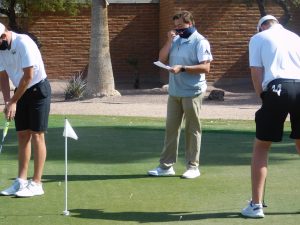- Slug: Sports-Pima College COVID Protocol, 900 words.
- Photo available
By Alyssa Gomez
Cronkite News
TUCSON – The COVID-19 pandemic shut down Pima Community College for more than a year beginning in March of 2020, placing its athletic teams on an indefinite hold and spreading panic throughout the department. Jim Monaco, the athletic director, worried that the school might lose students whose participation in sports is, as he described it, the “carrot” that keeps them in college.
“Most people in general have a very difficult time with online courses,” Monaco said. “How do we keep these kids involved and keep them invested in the athletics department so that we can continue to monitor how they’re doing in classes?”
In coming up with answers, athletics department officials created a system that brought the Pima sports family closer and was so successful it has attracted the attention of other universities looking to implement the same protocols.
Head athletic trainer April Jessee and her sports injury management team swooped in and came up with protocols that they presented in a 26-page document.
Jessee knew how important it was to deliver something that the Pima Board of Directors would approve to get students back to participating in their sports. Pima Community College, a National Junior College Athletic Association Division I member, fields 18 sports teams – nine men’s and nine women’s, including indoor and outdoor track and field and cross country, that include more than 300 students.
“They just want to play,” Jessee said. “They just want to compete. They were like, ‘Anything you need us to do, we’re gonna do because we just want to get on the floor.’”
The protocols included a three-step process to clear students to return to their sport. At first, each student would have to work out and practice individually. As time went on, students were allowed to work in smaller groups.
Students also had to wear masks unless they were actively playing. The volleyball team was one of the first teams to resume competition and its members played it extra-safe, wearing their masks at all times through their final tournament in Iowa, where they were one of only two teams to compete while wearing face coverings.
“They just decided that it worked so well, why go to Iowa and risk an illness?” Monaco said.
The last step of the process required students to complete a daily symptom check through Google documents before stepping on school property.
Everybody bought into the protocols, allowing the students to create a safe environment. Every Pima Community College team member that participated in a national tournament tested negative for COVID-19 before leaving, allowing for no student to be left behind.
“We had universities calling us going, ‘How do you guys do this?’” Monaco said. “We actually went above and beyond and made ourselves a bubble.”
Members of the injury management team saw their efforts succeed firsthand. Athletic trainer Becky Fajardo joined Pima in September of 2021 and assisted the men’s soccer team as it won the NJCAA national championship.
“The team has very high athletic standards,” Fajardo said. “The guys understand we’re traveling halfway across the country. And once we do that, we need to make sure that we’re following our protocols. COVID is just one small part of the big picture, but it can throw a big wrench into it if things aren’t taken care of.”
Fajardo said she was impressed with the buy-in factor of everyone associated with all the teams.
“Pima is the next level and got the buy-in from the students,” Fajardo said. “The even better part of it is the coaches.There’s no kickback on that end, either. They back everything they do.”
Athletic trainer Akira Kondo not only helped the injury management team, he also was an adjunct professor who had to redirect his focus to online classes. He used his eight years of athletic training at Pima to help him in the transition.
“It was a learning experience being away from everyone,” Kondo said. “Athletic training prepared me because we have no idea what’s coming next.”
The one thing that kept the department together was teamwork. All members of the sports injury management recognized how important it was to be on the same page and become a family.
“When I took over four years ago, my absolute main goal was to make the athletic department more family oriented, because we can’t compete, win and do what we need to do without each other,” Monaco said.
Pima Community College had family in mind as it eased back into sports. Originally, the teams started to live stream their games when fans were not allowed in. This didn’t stop families from rallying around the baseball team. They created what Monaco called “COVID Hill.”
Families brought grills and chairs to a small berm beyond the right field fence and cheered the team on from a distance. Eventually parents were rewarded for their efforts by having a section created for them closer to the field.
“If you do what we’re asking, we’d love to have you here,” Monaco said. “It went from five parents to 45 parents real quick.”
The rallying support on all fronts allowed for a successful adjustment back to the world the athletes once knew.
“We’re in the same boat together,” Jessee said. “We just want the kids to be able to compete and they’re willing to do whatever and the administration is willing to do whatever we need to do.”
For more stories from Cronkite News, visit cronkitenews.azpbs.org.
